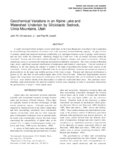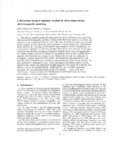|
|
Creator | Title | Description | Subject | Date |
| 1 |
 | Chapman, David S. | Techniques, analysis, and noise in a Salt Lake Valley 4D gravity experiment | Repeated high-precision gravity measurements using an automated gravimeter and analysis of time series of 1-Hz samples allowed gravity measurements to be made with an accuracy of 5 μGal or better. Nonlinear instrument drift was removed using a new empirical staircase function built from multiple ... | Gravity measurements | 2008 |
| 2 |
 | Jewell, Paul | Controls of tufa development in Pleistocene Lake Bonneville, Utah | Prominent tufa localities along the Provo level (∼14,000 14C yr B.P.) shoreline in Pleistocene Lake Bonneville have been characterized in detail. Three types of tufa are recognized: capping tufa, beachrock, and capping tufa over beachrock. Capping tufa and beachrock are end members of a continuum ... | Tufa; Pleistocene; pluvial lakes | 2006 |
| 3 |
 | Jewell, Paul | Geochemical variations in an alpine lake and watershed underlain by siliciclastic bedrock, Uinta Mountains, Utah | A small watershed which includes several small lakes in the Uinta Mountains of northern Utah is underlain by monolithologic Precambrian siliciclastic rock with extremely limited buffering capacity. In spite of this, s\ stematic spatial and temporal variations in alkalinity, pH, and major elements oc... | | 1998-01-01 |
| 4 |
 | Chapman, David S. | Reply to comment by T.J. Osborn and K. R. Briffa on "Mid-Latitude (30?-60?N) climatic warming inferred by combining borehole temperatures with surface air temperatures" | We thank Osborn and Briffa [2002] for their comment regarding our use of the climatic reconstruction of Overpeck et al. [1997]. We [Harris and Chapman, 2001] had taken a proxy, Arctic wide summer-weighted annual temperature reconstruction [Overpeck et al., 1997], given in dimensionless sigma units (... | Surface air temperature; Ground surface temperature; Borehole temperatures; Geothermal observations; Heat transfer | 2002 |
| 5 |
 | Chapman, David S. | Exhumation of the central Wasatch Mountains, Utah: 2, thermokinematic model of exhumation, erosion, and thermochronometer interpretation | The Wasatch fault is a ~370 km long normal fault in Utah that marks the boundary between the stable Colorado Plateau to the east and the extending Basin and Range to the west. Understanding the thermokinematic evolution of this fault can provide insights into intracontinental extensional tectonics a... | Uplift; exhumation; Wasatch Fault; Wasatch Mountains; Utah; helium dating; fission track; tectonophysics; extensional tectonics; geothermal observations | 2002 |
| 6 |
 | Zhdanov, Michael | Contraction integral equation method in three-dimensional electromagnetic modeling | The integral equation method has been proven to be an efficient tool to model threedimensional electromagnetic problems . Owing to the full linear system to be solved, the method has been considered effective only in the case of models consisting of a strongly limited number of cells. However, recen... | | 2002-01-01 |
| 7 |
 | Zhdanov, Michael S. | Fast numerical modeling of multitransmitter electromagnetic data using multigrid quasi-linear approximation | Multitransmitter electromagnetic (EM) surveys are widely used in remote-sensing and geophysical exploration. The interpretation of the multitransmitter geophysical data requires numerous three-dimensional (3-D) modelings of the responses of the receivers for different geoelectrical models of comple... | multitransmitter electromagnetic data; numerical modeling; multigrid quasi-linear approximation; quasilinear approximation; geophysical exploration; 3-D modeling | 2006-06 |
| 8 |
 | Zhdanov, Michael | Large-scale 3D inversion of marine magnetotelluric data: Case study from the Gemini prospect, Gulf of Mexico | Three-dimensional magnetotelluric (MT) inversion is an emerging technique for offshore hydrocarbon exploration. We have developed a new approach to the 3D inversion of MT data, based on the integral equation method. The Tikhonov regularization and physical constraint have been used to obtain a stab... | | 2011 |
| 9 |
 | Brown, Francis Harold | Magnetostratigraphy of the Koobi Fora Formation, Lake Turkana, Kenya | The Koobi Fora Formation, a Pliocene and Pleistocene sequence of sedimentary deposits northeast of Lake Turkana, has yielded numerous fossils and stone artifacts of early hominids. Stratigraphic correlation of the hominid-bearing deposits throughout the Turkana region was established primarily by th... | | 1986 |
| 10 |
 | Chapman, David S. | Exhumation of the central Wasatch Mountains, Utah: 1, Patterns and timing of exhumation deduced from low-temperature thermochronology data | The Wasatch Mountains are often cited as an example of normal fault growth and footwall flexure. They represent a tilted footwall at the edge of the Basin and Range extensional province, a major rift basin. Thus understanding the detailed spatial and elevation changes in coupled thermochronometer da... | Uplift; exhumation; Wasatch fault; Wasatch Mountains; Utah; helium dating; fission track; tectonophysics; Extensional tectonics; geothermal observations | 2002 |
| 11 |
 | Brown, Francis Harold | Correlation of tephra layers from the Western Rift Valley (Uganda) to the Turkana Basin (Ethiopia/Kenya) and the Gulf of Aden | Four volcanic ashes have been mapped in Albertine Group strata (Warwire, Kaiso Village and Nyabusosi Formations) Western Rift Valley, Uganda. Three of these tuffs have geochemical fingerprints similar to tuffs in the Turkana Basin (Ethiopia, Kenya), in Afar (Ethiopia) and the Gulf of Aden, permitti... | | 1991 |
| 12 |
 | Solomon, Douglas Kip | Evaluating the use of strontium isotopes in tree rings to record the isotopic signal of dust deposited on the Wasatch Mountains | Dust cycling from the Great Basin to the Rocky Mountains is an important component of ecological and hydrological processes. We investigated the use of strontium (Sr) concentrations and isotope ratios (87Sr/86Sr) in tree rings as a proxy for dust deposition. We report Sr concentrations and isotope r... | | 2014-01-01 |
| 13 |
 | Brown, Francis Harold | Geological development of the Omo-Turkana Basin during the pliocene and pleistocene epochs | Pliocene and Pleistocene deposits of the Omo-Turkana Basin extend from 6?N latitude to about 2?N latitude (-450 km), and laterally from about 35.5?E to 36.5?E. Sediments are brought to the basin by the Omo River which rises in Ethiopia, and by the Turkwel and Kerio Rivers which rise in Kenya and Uga... | | 2004 |
| 14 |
 | Brown, Francis Harold | A reappraisal of the geomagnetic polarity time scale to 4 MA using data from the turkana basin, East Africa | Recalibration of the Pliocene and early Pleistocene geomagnetic time scale using the K-Ar dated fluvial sequence of the Turkana Basin in East Africa agrees with calibrations based on astronomical calculations. Ages estimated here are: Olduvai Subchron, 1.78-1.96 Ma; Reunion Subchrons, 2.11-2.15 Ma ... | | 2012 |
| 15 |
 | Chapman, David S. | Thermal analysis of the southern Powder River Basin, Wyoming | Temperature and geologic data from over 3000 oil and gas wells within a 180 km x 30 km area that transect across the southern Powder River Basin in Wyoming, U.S.A., were used to determine the present thermal regime of the basin. Three-dimensional temperature fields within the transect, based on... | Thermal analysis; inversion; bottom hole temperature | 1996-11 |
| 16 |
 | Chapman, David S.; Harris, Robert N. | Mid-Latitude (30°-60° N) climatic warming inferred by combining borehole temperatures with surface air temperatures | We construct a mid-latitude (30°-60° N) reduced temperature-depth profile from a global borehole temperature database compiled for climate reconstruction. This reduced temperature profile is interpreted in terms of past surface ground temperature change and indicates warming on the order of 1°C... | Surface air temperature; Surface ground temperature; Borehole temperatures; Geothermal observations | 2001 |
| 17 |
 | Zhdanov, Michael S. | Integral equation method for 3D modeling of electromagnetic fields in complex structures with inhomogeneous background conductivity | We present a new formulation of the integral equation (IE) method for three-dimensional (3D) electromagnetic (EM) modeling in complex structures with inhomogeneous background conductivity (IBC). This method overcomes the standard limitation of the conventional IE method related to the use of a horiz... | 3-D modeling; integral equation method; marine controlled-source electromagnetic data; MCSEM; gemini prospect; Gulf of Mexico | 2006 |
| 18 |
 | Brown, Francis Harold | Gombe group basalts and initiation of pliocene deposition in the Turkana depression, northern Kenya and southern Ethiopia | A little before 4 Ma ago, deposition of Pliocene and Pleistocene strata described as the Omo Group began in the Turkana and Omo basins of northern Kenya and southern Ethiopia. Soon after, basaltic magma erupted as thin lava flows, and intruded as dykes into the oldest Pliocene strata of the basin. T... | | 2004 |
| 19 |
 | Chapman, David S.; Allis, Richard George | Late Neogene exhumation patterns in Taranaki Basin (New Zealand): evidence from offset porosity-depth trends | Taranaki Basin, New Zealand, is located adjacent to the Australian-Pacific Plate boundary where the tectonic regime changes from dominantly subduction-related to the north to transpression-related along the Alpine Fault to the south. During the Neogene, burial and exhumation varied extensively, in ... | Neogene; uplift; exhumation; Taranaki Basin; New Zealand | 1998 |
| 20 |
 | Chapman, David S. | Monitoring aquifer recharge using repeated high-precision gravity measurements: a pilot study in South Weber, Utah | Repeated high-precision gravity surveys were conducted over two infiltration cycles on an alluvial-fan aquifer system at the mouth of Weber Canyon in northern Utah as part of the Weber River Basin Aquifer Storage and Recovery Pilot Project (WRBASR). Gravity measurements collected before, during, an... | Aquifer recharge; Gravity measurements; Infiltration ponds; Weber River Basin Aquifer Storage and Recovery Pilot Project | 2008 |
| 21 |
 | Brown, Francis Harold | Dating | There are basically three lines of investigation that are involved in geochronology ? the dating of rocks and other earth materials. First, there are the physical and chemical dating methods which give us numerical estimates of age. Second, there is the reconstruction of the order of events in sec... | | 1984 |
| 22 |
 | Jewell, Paul | Geology and geothermal potential North of Wells, Nevada | This report was prepared as an account of work sponsored by an agency of the United States Government. Neither the United States Government nor any agency Thereof, nor any of their employees, makes any warranty, express or implied, or assumes any legal liability or responsibility for the accuracy, ... | tertiary sediments; siltstones; conglomerates; lithologies; well logs; aquifers; step faults | 1982-01-01 |
| 23 |
 | Zhdanov, Michael S. | Rigorous 3D inversion of marine CSEM data based on the integral equation method | Marine controlled-source electromagnetic (MCSEM) surveys have become an important part of offshore petroleum exploration. However, due to enormous computational difficulties with full 3D inversion, practical interpretation of MCSEM data is still a very challenging problem. We present a new approach ... | | 2007 |
| 24 |
 | Chapman, David S. | Air, ground, and groundwater recharge temperatures in an alpine setting, Brighton Basin, Utah | Noble gases are useful tracers for constraining groundwater recharge temperature and elevation, critical in determining source areas of groundwater recharge in mountainous terrain. A monitoring network in the alpine Brighton Basin in the Wasatch Mountains of northern Utah, USA, was established to ex... | | 2012-01-01 |
| 25 |
 | Brown, Francis Harold | Timing of volcanism and evolution of the northern Kenya Rift | The northern Kenya Rift is bounded on the west by uplands of Turkana which comprise horst-like blocks that include metamorphic basement rocks, locally overlain unconformably by the Cretaceous Lubur Sandstone, in turn overlain by predominantly volcanic sequences in which relatively thin sedimentary p... | | 2009 |

























